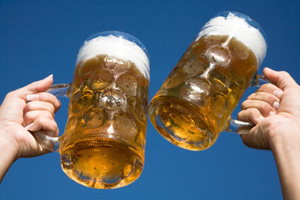Supreme Court Clarifies Wisconsin’s Liquor License Law, Sides
with Resort
By Joe Forward, Legal Writer,
State Bar of Wisconsin
 July 9, 2012 – A unanimous Wisconsin Supreme Court recently
ruled in favor of an adult-oriented resort near Wisconsin Dells while
clarifying the state’s law on liquor licensing.
July 9, 2012 – A unanimous Wisconsin Supreme Court recently
ruled in favor of an adult-oriented resort near Wisconsin Dells while
clarifying the state’s law on liquor licensing.
In 2009, the Town of Dell Prairie restricted the “class B”
liquor license of Wisconsin Dolls resort, which applied to renew its
license covering sales, storage, and consumption on the entire eight
acres of the property. The town had approved that broad license in the
previous five years.
The town modified the renewal license to cover only the main bar and
entertainment area of the resort, not all eight acres. The board was
concerned about underage drinking on the premises and vowed to more
closely scrutinize liquor licenses, according to meeting minutes.
Wisconsin Dolls sued. The circuit court ruled in favor of the town,
concluding that the town’s modification was meant to
“particularly describe the premises,” which is required by
law.
An appeals court affirmed, ruling that a previous renewal did not
particularly describe the premises and was void. An original, not a
renewal, had to be filed, the appeals court said.
But in Wisconsin
Dolls LLC v. Town of Dell Prairie, 2012 WI 76 (July 5, 2012),
the state supreme court reversed, concluding that the resort’s
renewal, and the original license, were not void due to an insufficient
description of the premises to be used for storage, sales, and
consumption.
“A town is not permitted to unilaterally reduce the description
of the premises when it renews an alcohol beverages license,”
wrote Justice David Prosser for the court.
The supreme court explained that towns can’t modify renewal
licenses unless they pass a valid regulation or ordinance under Wis.
Stat. section 125.10(1),
find grounds for revocation or nonrenewal under section 125.12,
“or negotiate the consent of the licensee.”
“The Town here did not proceed on a correct theory of law, and
thus its modification of the license cannot be sustained,” wrote
Justice Prosser, noting that the legislature has never required alcohol
to be sold and consumed only in buildings.
“We suspect that most people would not be able to identify where
the alcohol beverages license is posted at Lambeau Field or Camp Randall
Stadium,” the court noted.
Towns and licensees are well-advised to work out these issues before
the original license is granted, the court explained. But towns
can’t unilaterally modify renewals once granted.
